Changing the world one PyCon at a time
2017-06-15
Changing the world one PyCon at a time
As an engineer, programming languages are very important tools to solve the problems that you face. As an entrepreneur, they are also important tools to bring your imagination to life, to get that profit and make that difference.
Python is a magnificent programming language. Although first released in 1991, it arguably only started to become mainstream1 when Guido van Rossum, the creator of Python joined Google in 2005. That made many people start to notice how serious the tech giant was investing in Python. In the same year, the web framework Django which is written in Python was released, and that further pushed Python into the limelight.
Now, even our very much loved Instagram uses Python to handle its hundreds of millions of requests. Python is also used in scientific and academic fields
I have been using Python since 2002, and in many ways, it has given me the intellectual challenge I craved, allowed me the freedom to bring my imagination to life, and PyCon, has allowed me to meet wonderful people.
My First PyCon, APAC 2010 in Singapore
But a programming language is only as good as the people who use it.
PyCon is, in essence, a conference centred around the Python programming language. Its roots started with the first PyCon in Washington D.C in 2003 and has expanded to many parts of the world, from Europe, Japan, China, India, HK, Taiwan, Australia, New Zealand, Singapore and also Malaysia.
Up until 2010, before attending my first PyCon, I had been using Python for fun and profit for 8 years. I find the language easy to use, has a design that fits with my mind and how I believe coding should be, and most importantly I enjoyed using it to build stuff.
So when I saw the poster for the first PyCon APAC in Singapore in 2010, I decided to meet the people behind it:
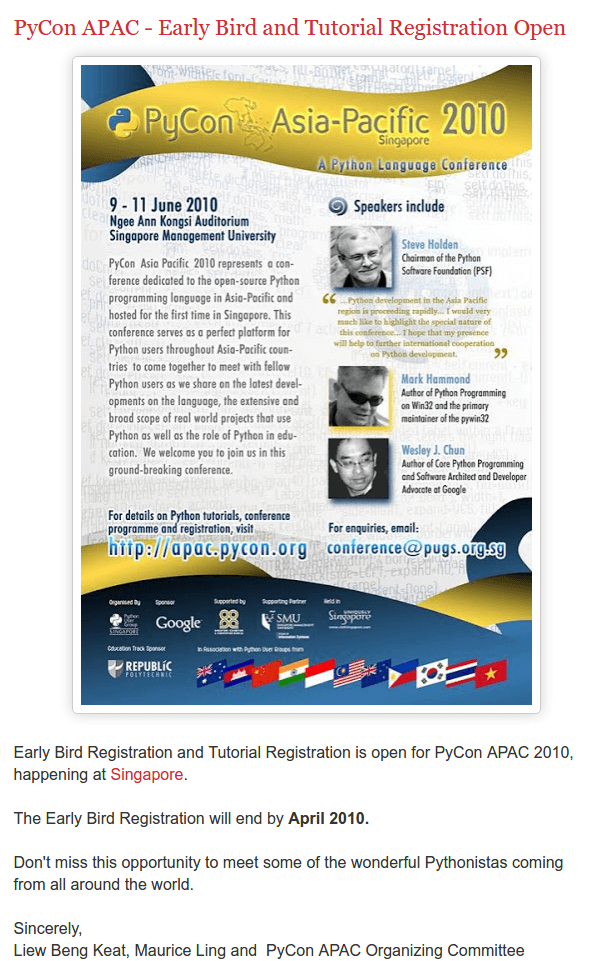
I didn't know anyone there but I thought I'd just make new friends and see what other cool stuff everyone else was building. And made friends I did: I met up with three other participants from Japan: Manabu Terada (@terapyon), Yasuhi Masuda(@whosaysni) and Ian Lewis(@ianmlewis).
As it turns out, the chairperson for the first PyCon APAC in Singapore was Liew Beng Keat (@bengkeatliew) a Malaysian from Kuala Lumpur. We have more in common than I thought!
Bringing PyCon to the region
It was then that Beng Keat was telling me the reason he wanted to organize a regional version of PyCon APAC: Beng Keat had the opportunity to attend PyCon in the United States, and although he enjoyed the conference and came back enlightened, he also realized how prohibitive it is to travel from Asia to the United States and so he thought: If we can't go to PyCon in the US, we'll bring PyCon here. And since Singapore was such a small place, it makes more sense to make it a regional conference instead of just a local conference.
The concept of having a regional PyCon is in essence a very simple one, with a well defined purpose: We understand that nearly all of the advances made in technology by the programming language, new concepts and philosophy in thinking about the language and even how communities are organized towards the greater good for everyone at large originates mostly in the United States and Europe.
If we cannot be in the United States to meet and listen to the great minds that shape the programming language, its community and its future, let us have those minds here instead.
And at that first APAC PyCon in Singapore, one of the keynote speakers was Steve Holden, who was the chairman for PSF2, who later on was a pivotal figure in the growth of PyCon within APAC.
Building the Japan PyCon community, circa 2011
We invited Steve to come to Tokyo after APAC, and over dinner, we talked about having an annual conference to get Pythonistas from all over the country to come and share their work and discuss their ideas. Steve was instrumental in providing us, who had no experience at all running conferences, to take the idea seriously. Given the fact that Python was still considered an obscure language in Japan as opposed to PHP, Java or Ruby, we were also sceptical that there would be any traction at all.
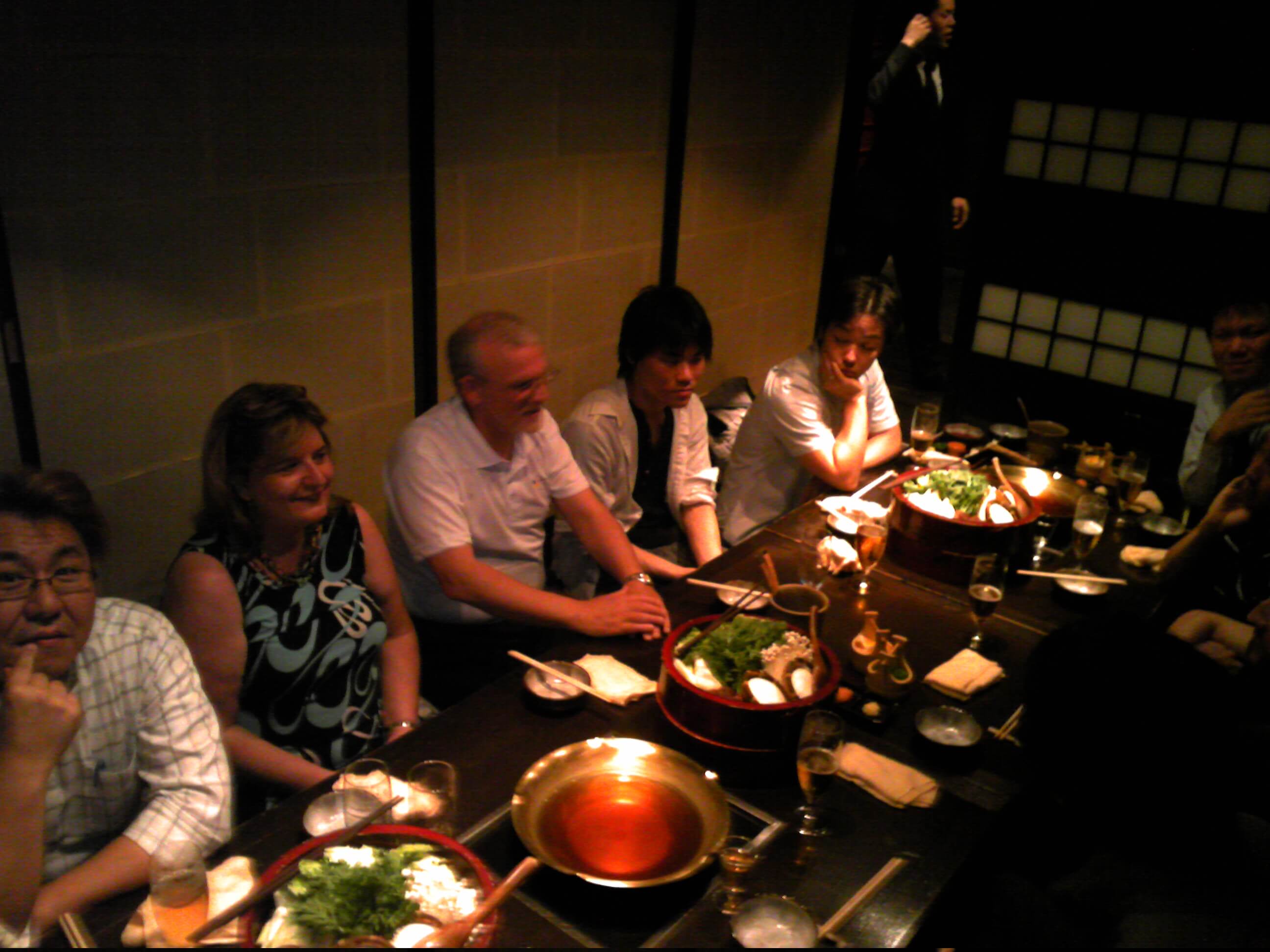 Dinner with Steve in Roppongi
Dinner with Steve in Roppongi
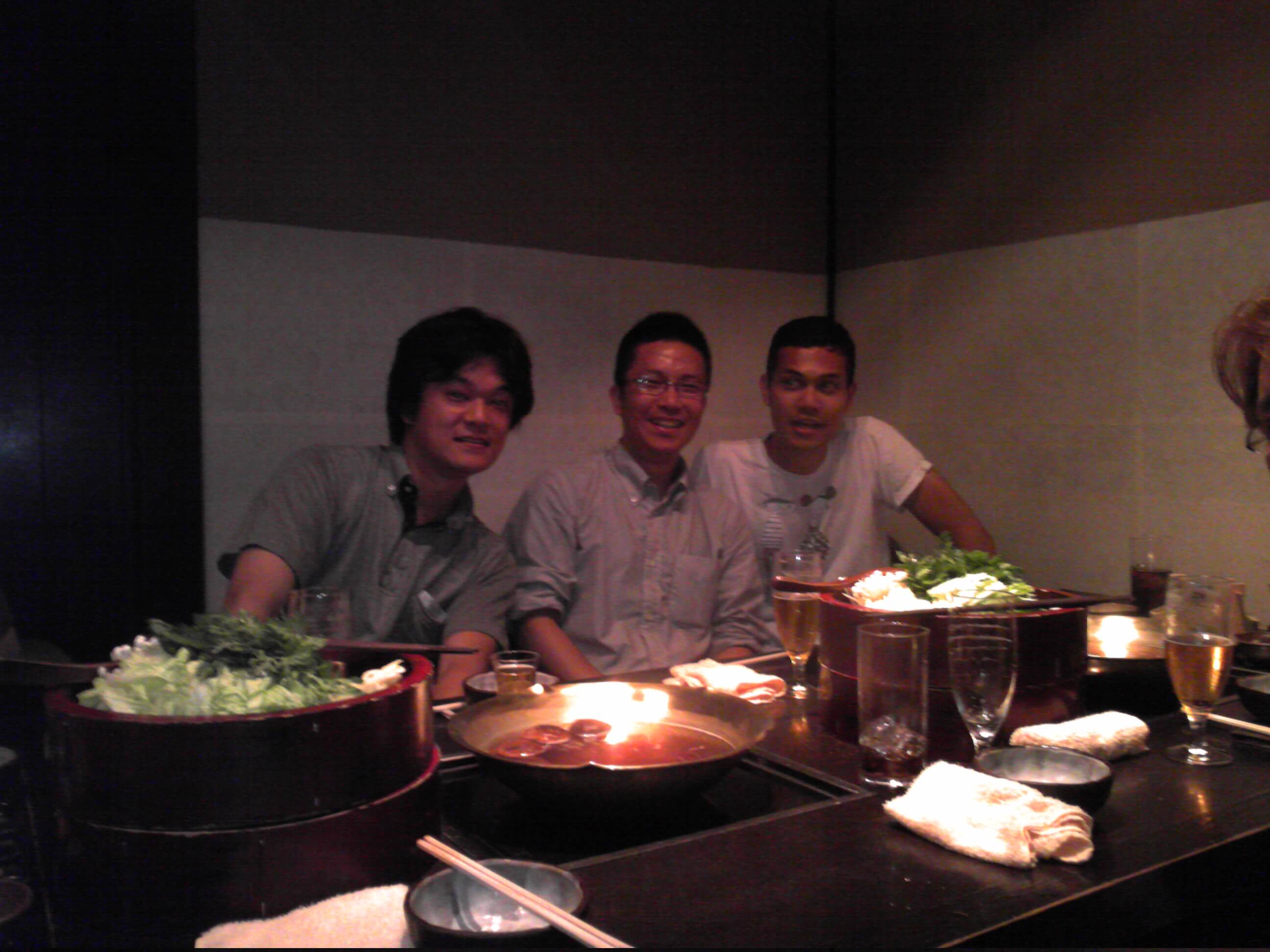 With Masuda-san and Takizawa-san
With Masuda-san and Takizawa-san
Following that dinner with Steve, Terada-san, Masuda-san and I met again on the 1st of July 2010 in an underground Turkish restaurant in Shibuya and over dinner decided to have our first stab at a PyCon in Japan. We agreed to start small, and host APAC when we are ready.
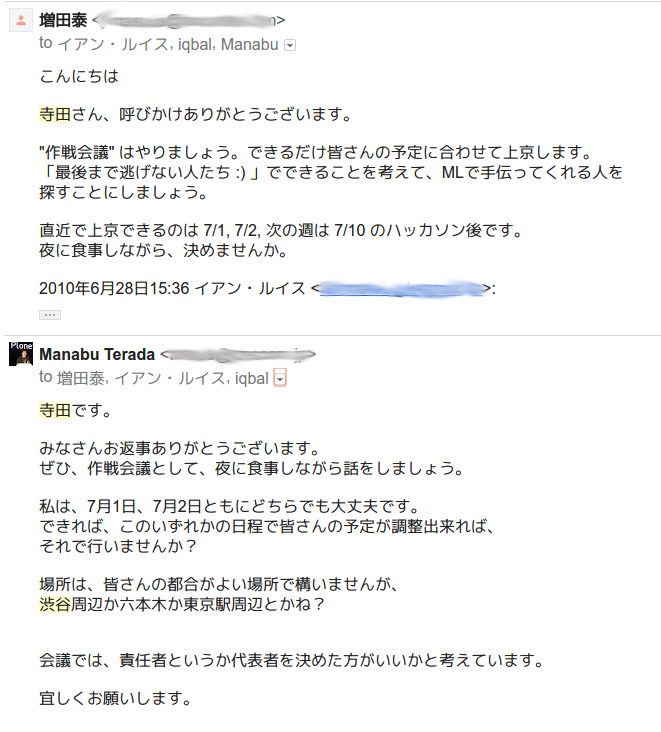
We had our first mini PyCon JP on a cold January morning in 2011 at the Rakuten offices in Tokyo. I was involved as the program manager, choosing talks and deciding the contents of the conference. 130 people came for the mini-conference, and we all had a great time listening to talks, learning and making new friends. The conference was free, and everyone had bento for lunch provided by our generous sponsors.
Encouraged by the turnout and how the first conference went, we then decided to have a major PyCon JP for the first time in the summer of 2011.
PyCon JP has been held every year around summer since then and in 2016 our attendees topped 700 people.
Back to 2012: An issue that we faced after the second PyCon in 2012 was that it was getting too big, and the leftover money from sponsors was getting too much to handle out from an individual account. We also needed a face for the public and a definite entity that will take responsibility for managing the annual conference in Japan.
Because of that, the non-profit PyCon JP was established in March 2013, and I am still currently serving as part of the board members.
To prepare to host APAC, since 2012 we needed to give an international flavour for the conference, and we made it a point to have at least one track which will be in English only. This has attracted participation from nearby countries, such as South Korea and Taiwan.
To also attract interest from the public, and because our non-profit run on money gained from public interests, we also made it a point to have an open non-profit general meeting during the local PyCons. It is here where we met other people who are thinking or are interested in running their own PyCons.
PyCon APAC in Japan, 2013
Singapore has been organizing the APAC conference for 3 years in a row since 2010, and following the model of PyCon US of moving the venue to different cities every two years, 2013 they approached us in Japan to take over APAC and organize it is in Japan.
We have been preparing for this since 2011, so we agreed. Our Taiwan counterpart was also keen on running APAC, but after discussions they agreed to bid for 2014 instead.
This was good for us in the region on 2 accounts:
- The regional conference APAC has finally moved away from Singapore to a different city
- We have another host decided for 2014.
So in August 2013, we organized PyCon APAC in Shinjuku, Tokyo, and that is where we met all the many people who will spread PyCon across the region.
The Asia Pacific Connection
Regionally, we have a loosely knit community that drives PyCon APAC (Asia Pacific). Ideally, PyCon APAC is a regional conference that rotates between cities within the APAC region, and aims to be an international and bigger conference allowing the regional python community to come together at a more accessible and affordable location compared to having to travel to the United States or Europe.
After the APAC conference in Tokyo in 2013, there was consensus from the regional community representatives such as Singapore and South Korea which we managed to get in touch with when they came to APAC in Tokyo, to move the APAC conference to Taipei.
Since there was no other community which has shown interest in hosting APAC for 2015, the conference stayed in Taipi until 2015.
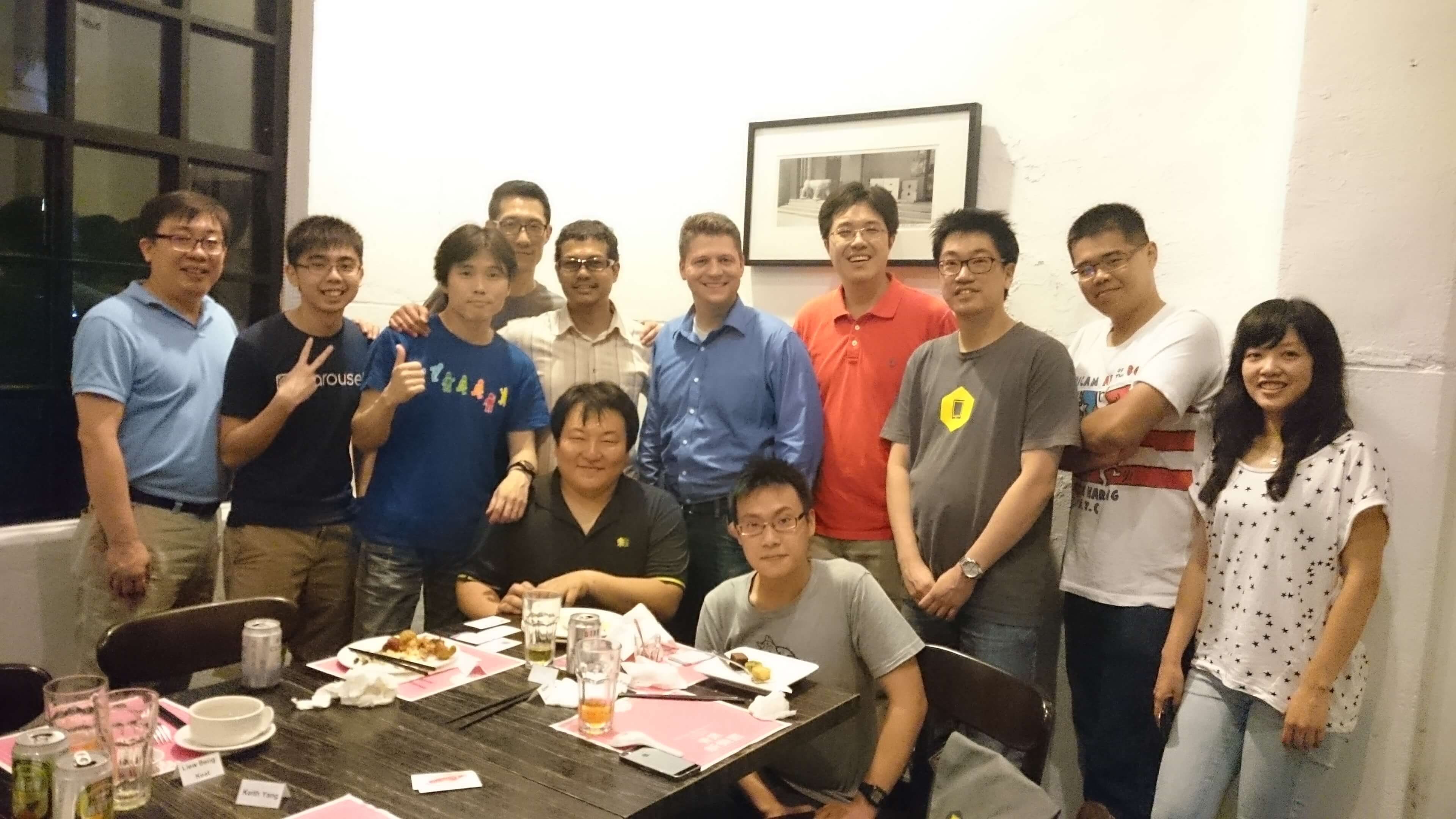 With Van Lindberg, Chairperson for the PSF, Beng Keat, and our friends and staff organizing
PyCon APAC TW in 2015.
With Van Lindberg, Chairperson for the PSF, Beng Keat, and our friends and staff organizing
PyCon APAC TW in 2015.
The South Korean community, after having their first local PyCon in 2015 stepped up to the plate to host APAC in 2016 and was successful with over 1000 attendees.
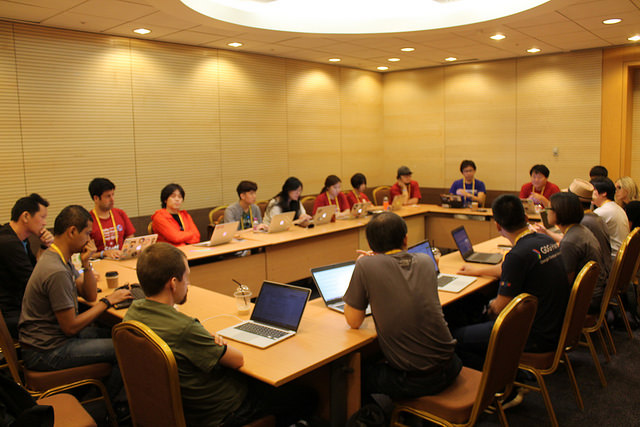 A community meeting of representatives from the different countries in APAC
during the 2016 APAC conference: KR, JP, VN, TW, PH, MY, HK and SG were present
A community meeting of representatives from the different countries in APAC
during the 2016 APAC conference: KR, JP, VN, TW, PH, MY, HK and SG were present
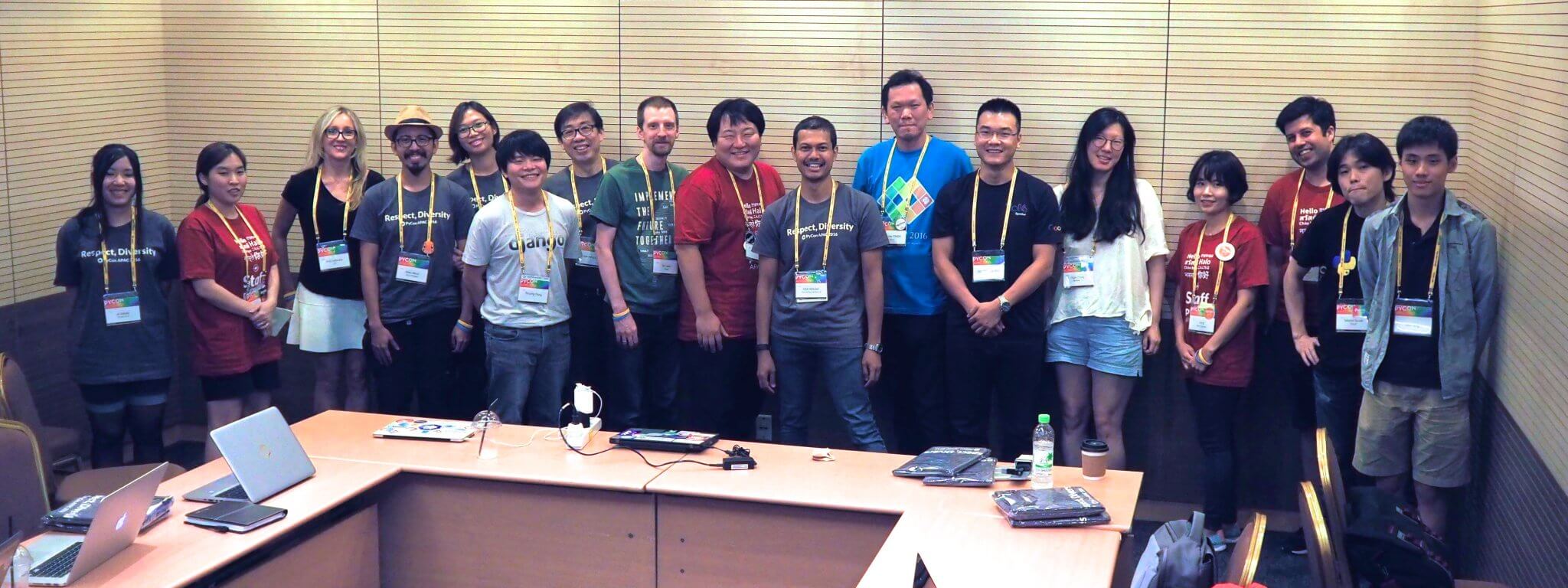 Group picture after the community meeting
Group picture after the community meeting
The regional communities have done a wonderful job of boosting their local PyCon conferences to be a well-known annual event to gather and share knowledge among their Python users. The regional APAC conferences have also proved to be a platform where new community leaders from neighbouring countries come to connect and learn how to organize their own local PyCons.
We make it a point to reach out to fellow community members from countries which up until now have no representation in our loose groups, like Myanmar or Vietnam. I've seen fellow Pythonistas who came to a PyCon APAC for the first time, and their eyes light up and they smile and say now they want to start something in their city and their community after experiencing the conference.
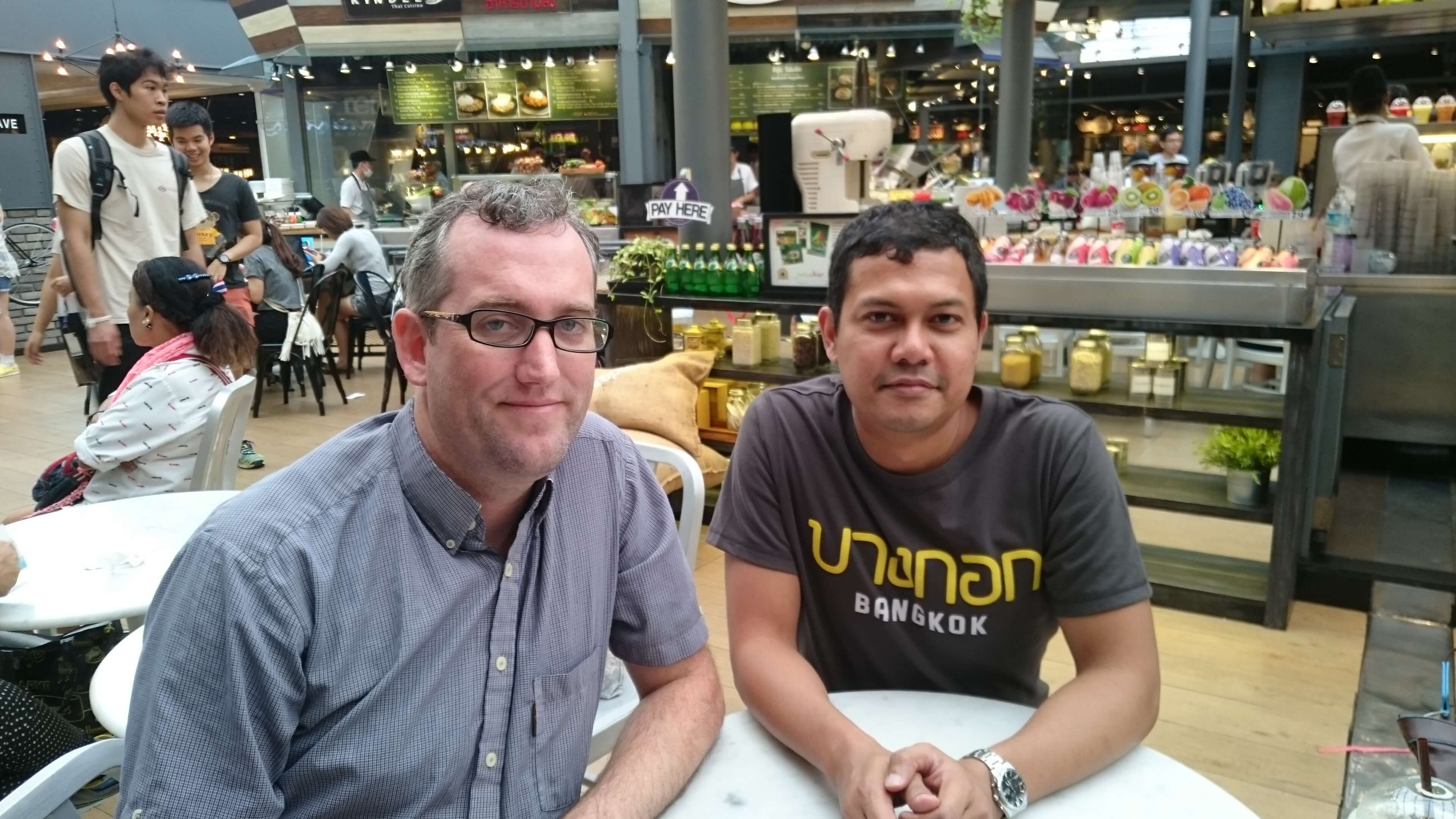 Meeting up with Dylan Jay in Bangkok. Dylan is the former lead for the Sydney
Python Users Group
Meeting up with Dylan Jay in Bangkok. Dylan is the former lead for the Sydney
Python Users Group
The collective knowledge of all of us helps to remove some anxiety and helps guide them on what are the points that they'll need to keep in mind to start something for their city, from organizing know-how to even getting sponsorship funding. The PSF in this regard has been supportive in providing grants and also speakers at the APAC conferences.
Connecting Pythonistas in Malaysia
After helping out with running PyCon in Japan, I realized that all the PyCons that we had in the APAC region has all been on the north-eastern part of Asia Pacific, except Singapore, but all of them were either cost or time prohibitive to the rest of Asia Pacific.
And that begins my next project: To kickstart an annual PyCon in Malaysia grown for the locals, from the locals, and bring APAC and the rest of the world to Kuala Lumpur.
I aim to have an APAC conference here in Kuala Lumpur as I believe, compared to the north-east of Asia Pacific, a conference here will be more accessible to much more people.
If we can't go to PyCon, we'll get PyCon here.
In Malaysia, the history of PyCon started in 2014 when we had our first mini PyCon (1 day, single track and 70 people attended) and continued with PyCon MY 2015 (2 days, 2 tracks and around 140 people attended) and PyCon MY 2016 (2 days, 2 tracks and around 100 people attended). I was involved as the co-chair and finance person for the mini PyCon 2014, the chair for PyCon MY 2015, and co-chair again in 2016.
You can read more about us at https://pycon.my/
But before we start running an international conference like the APAC, we need to know how to at least run a conference. Having local experienced people to organise conferences will also allow us to convince the other regional members that we are up to the job.
In 2014 there was already a loose group of Python users, who had meetups once every 2 or 3 months mainly around the Kuala Lumpur area, usually attended by more or less 10 people. As is common for any non-profit, grass-roots volunteer-driven small meetups with no monetary or marketing support from commercial entities, these meetups were mostly attended by the same group of people and before long you'll have organizers burning out, running out of steam and also things to talk about.
The de-facto organizer for these meetups then was Swee Meng, and I met him for the first time at one of Singapore's PyCon. When I suggested to him an annual PyCon for Malaysia, he was sceptical at first, given his bitter experience with user meetups. He was not convinced that people would come, but I told him that that was beside the point. If only 10 or 20 people come, so be it. That will be our Malaysian PyCon. Either way, it goes, that will be our learning experience, and we'll see where that leads us.
Since our first mini PyCon in 2014, many people have helped us, especially the kind generosity of venue providers, like iTrain, University Malaya and International University of Malaya-Wales. Nearly all the time we've had help from the academic staff of the universities who use Python as a learning tool and wanted their students to get involved in academic conferences like PyCon.
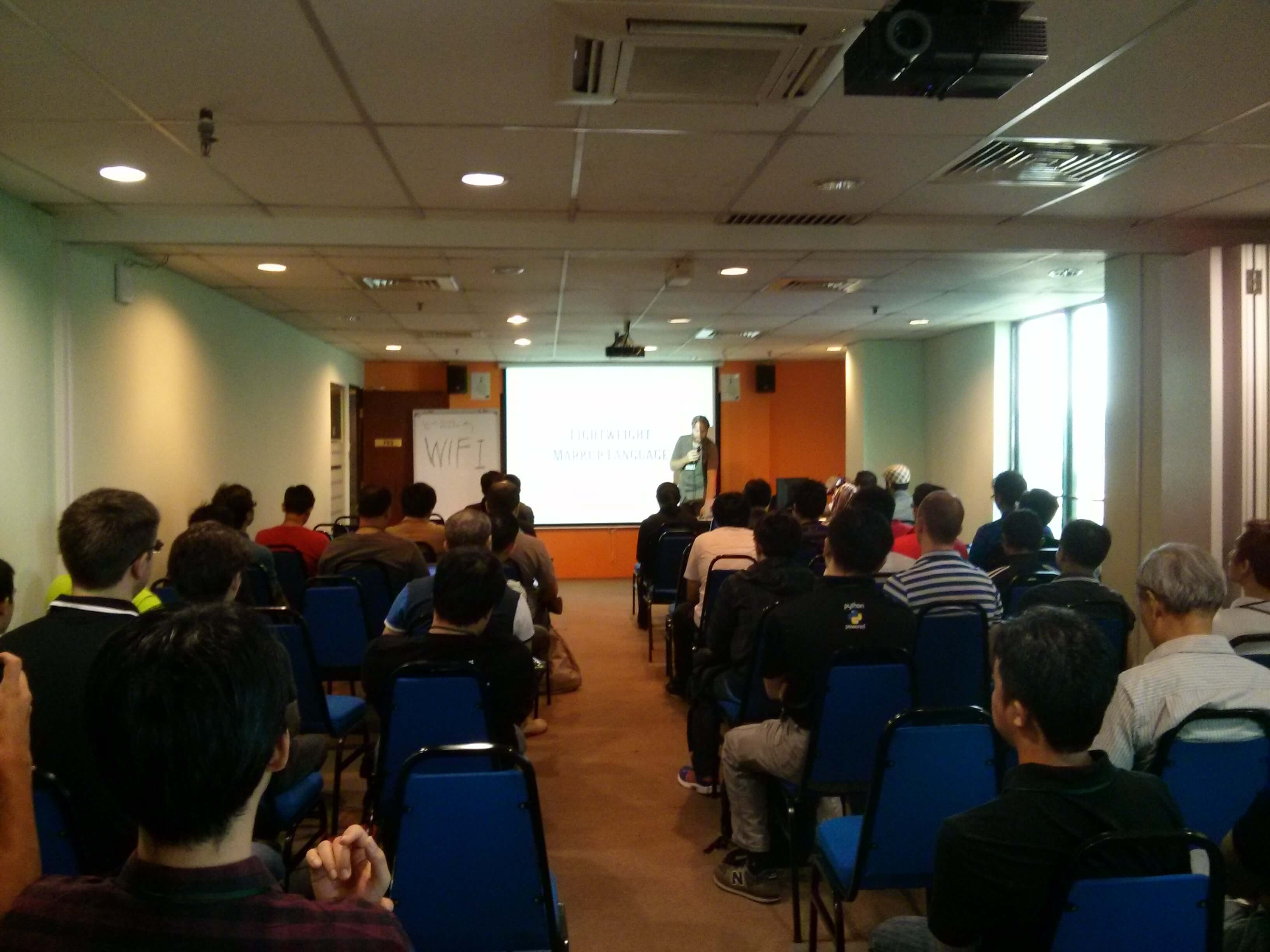 Our keynote for mini PyCon MY, Eric Holscher giving
his talk. Eric was in Kuala Lumpur for vacation and also decided to
contribute.
Our keynote for mini PyCon MY, Eric Holscher giving
his talk. Eric was in Kuala Lumpur for vacation and also decided to
contribute.
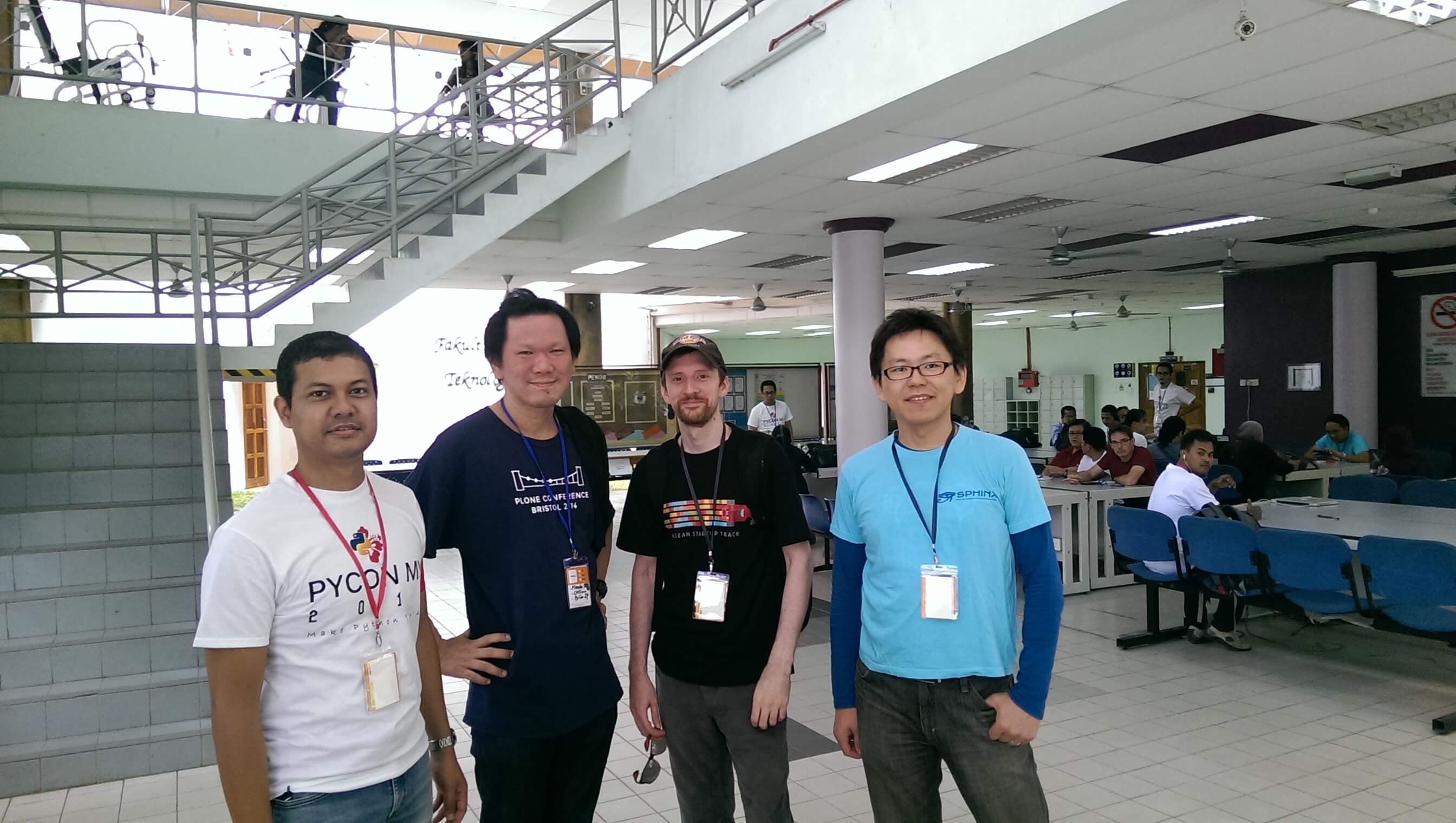 Members of PyCon JP coming in to support our first PyCon MY in the University
Malaya
Members of PyCon JP coming in to support our first PyCon MY in the University
Malaya
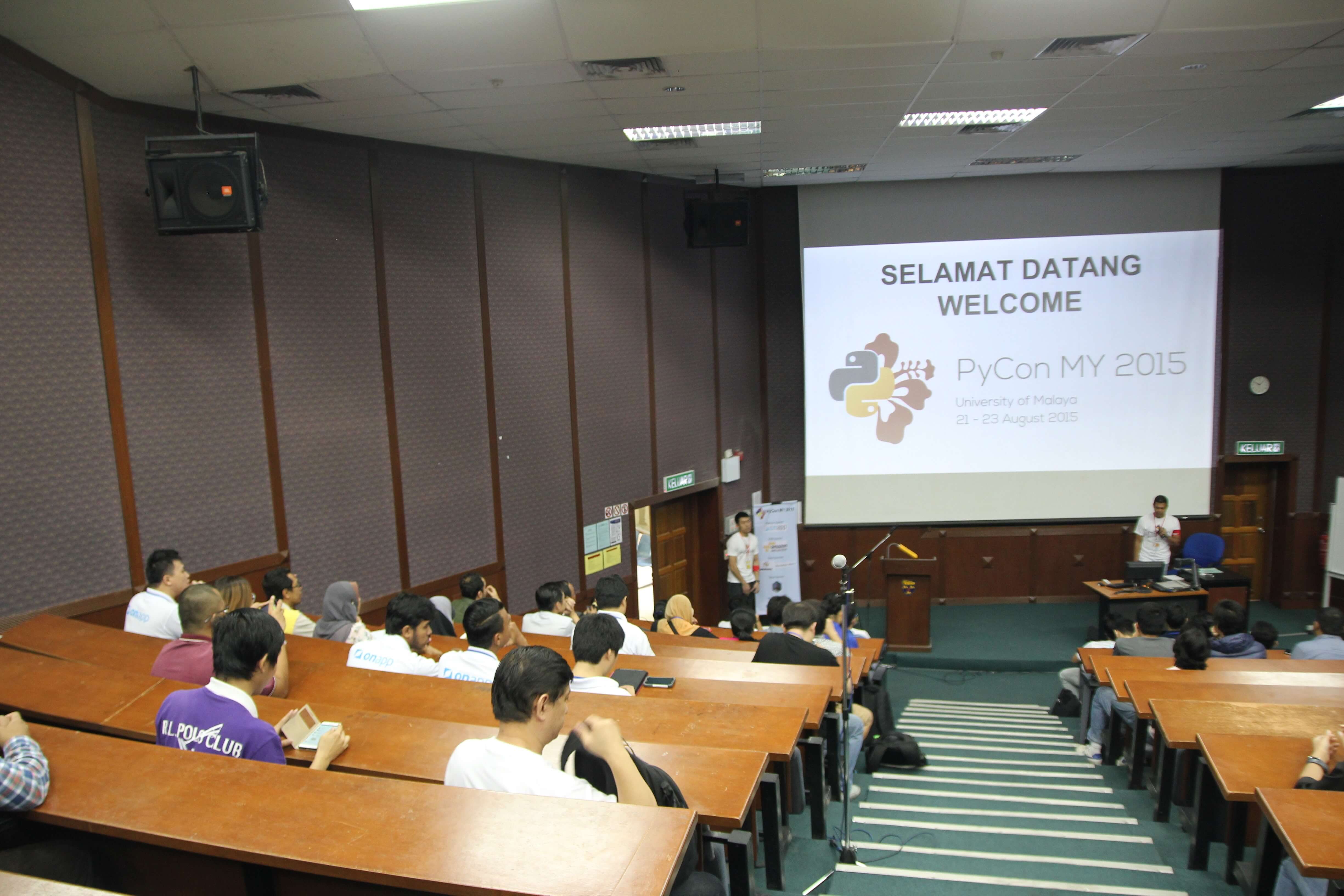 Kicking off PyCon MY 2015.
Kicking off PyCon MY 2015.
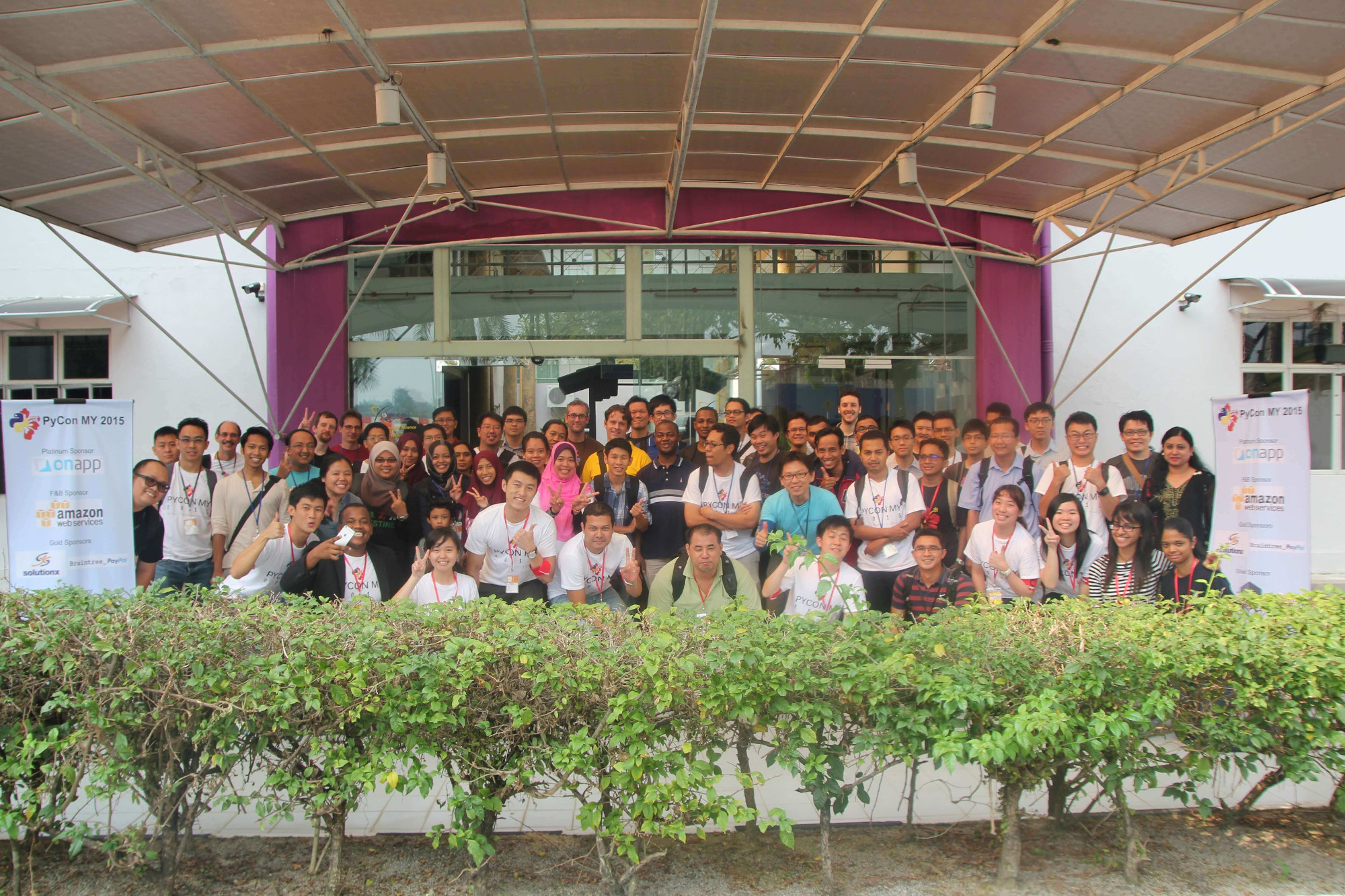 A group picture at the end of PyCon MY 2015.
A group picture at the end of PyCon MY 2015.
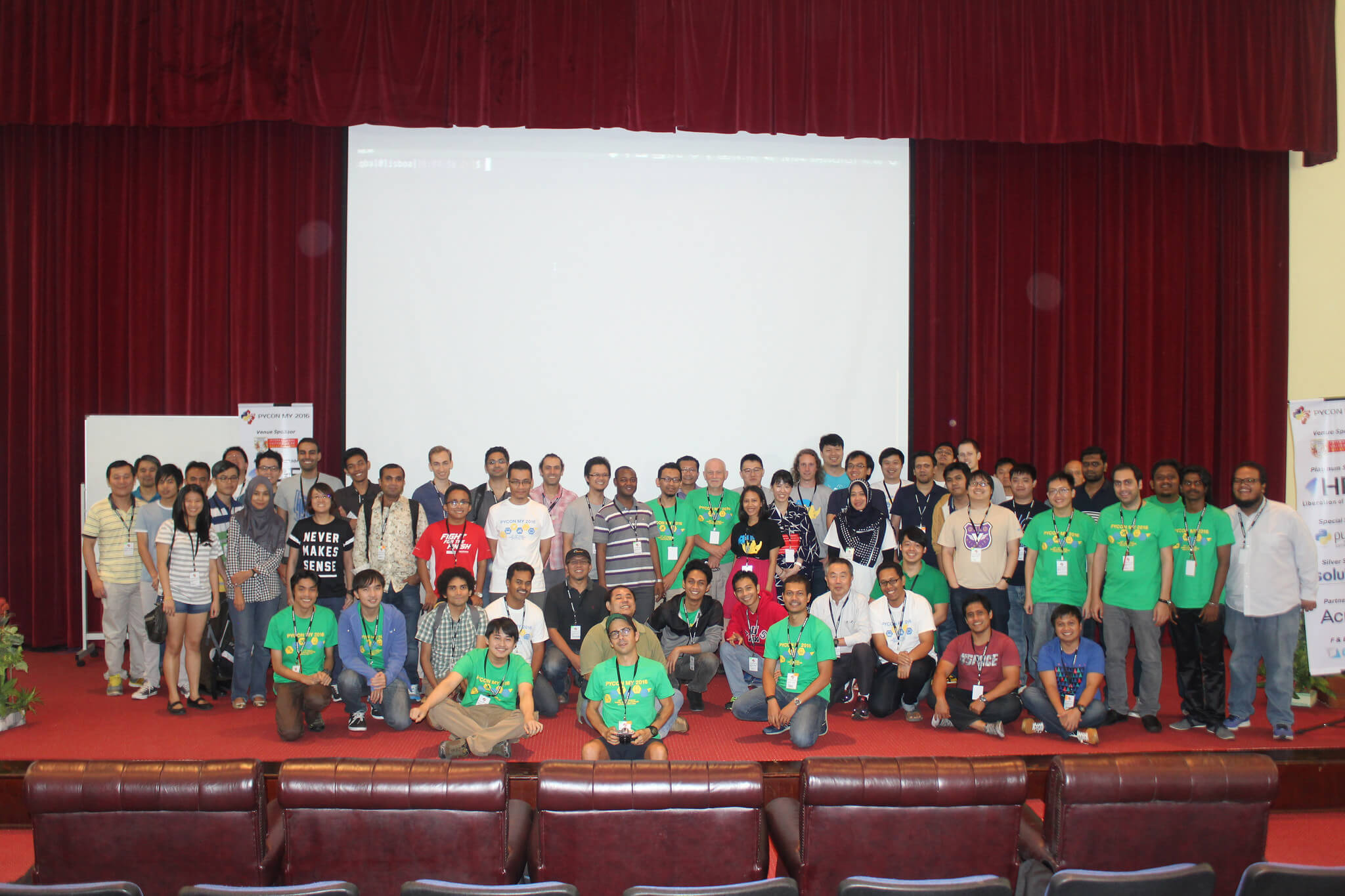 And the group picture at the end of PyCon MY 2016.
And the group picture at the end of PyCon MY 2016.
As if coming to a full circle, one of the keynote speakers for the first APAC in Singapore in 2010 (Steve Holden), and another keynote speaker for the first PyCon JP in 2011 (Tarek Ziadé, who works remotely in the bushes of Dijon, for Mozilla) was our keynote speaker in 2016.
I am happy to report that Tarek enjoyed his first-ever durian here in Kuala Lumpur when keynoting for us.
Following the model that we did in Japan, we have also set up a partnership in Malaysia to facilitate managing funds and also as a public-facing entity to be responsible for managing PyCon in Malaysia.
The local sponsors
Our local sponsors who have supported us until now are mostly small companies with personal relations to one of the members of the staff, that uses Python in their products or day-to-day operations. These companies are the most generous. They do not sponsor large amounts, but they are always ready to give a helping hand. I believe they are the ones who truly understand and appreciate how difficult it is to organize such a conference and the value that it will bring to them and the community.
For our 1st local PyCon, we did have big-name companies that sponsored us, like Amazon Web Services (AWS) and Braintree a subsidiary of PayPal. However, the young and still inexperienced Python crowd in Malaysia might not be a compelling reason yet for them to continue sponsoring.
PyCon APAC in Kuala Lumpur
For 2017, after proposing the APAC community, we have been selected to hold the responsibility of having PyCon APAC 2017 in Kuala Lumpur, which will be held in August.
What I would like to take the opportunity to highlight here is the wonderful work the community has done to bring PyCon APAC 2017, from universities, student volunteers, local companies and most of all the people that make up the community itself.
Personally in the Malaysian context, I believe we need more makers or programmers in our ecosystem. I feel that we focus too much on the business side of things, with "business-focused" conferences like match-making or raising venture capital. But these are all moot without the actual people and know-how to build what we want to sell. PyCon MY is that small ripple we're making to have a positive contribution to the overall builders and programming ecosystem.
With the title of being a regional conference, we now have the clout to invite successful technology practitioners from overseas to give talks and share their insights and ideas with the local crowd. This will hopefully spark interest and motivate them to further improve their skills and knowledge.
Changing the world one PyCon at a time
Through PyCon, the community also tries to practice common ground principles based on universally accepted ideas and ideals. All regional or local PyCons which request grants from the PSF are required to have a Code Of Conduct that governs how the organizers manage the conference, and also how the attendees behave and interact with one another during the conference.
These Code Of Conduct (CoC) reflects the values of the community and what they think is important. Not all talks during PyCons are about programming, web frameworks or libraries: Some of them are about the experiences of the speaker walking the path to become a female developer in an industry widely regarded as male-dominated, or the need to have more diversity and how it's achieved through free community training programs.
Focused groups like PyLadies (a Python group focused on women), DjangoCon (Conference focused on the Django framework) and SciPy (Conference for the users of Python in academics and science fields) also all contribute to these same ideas and ideals while adding more spice to the already vibrant Python community. In all this PyCon is the general conference that tries to cover many usages of Python.
Following the spirit of the community at large and the values and ideals that we try to have, for APAC this year and for the first time in the history of PyCon in Malaysia, we are trying a few new things, such as
- Financial Aid
- Tie up with Women Who Code (WHC)
- Having the conference at a commercial conference venue
- Reducing waste
- Subsidized ticketing
The Financial Aid, tie-up with WHC and subsidized ticketing all aim to increase participation from underrepresented groups who could not have attended the conference due to financial reasons, or also from female tech communities, which historically have little participation in tech conferences locally.
So in a way, PyCons are not only just a technical conference that you might expect from practitioners of a certain technology: It's also sort of a social movement. Although in PyCons you do have booths for companies the commercial aspects are very much watered down (as opposed to RISE or Web Summit).
With the PyCon and its culture blooming in this part of the world, I hope it will continue to be a place Pythonistas regardless of experience continue to meet, exchange ideas, interact and grow.
In essence, the aim of a conference like a PyCon, similar to the experience museums or art galleries offer is to enlighten you and transform you into a different person intellectually from the person that you were before attending the conference. In the context of conferences, this is mostly achieved from the human interaction that you've achieved by listening to and discussing talks and interacting with other attendees. These transformations do not have to be huge leaps. Knowledge transfers take time and require us to work on the new information many times in our minds before we can fully appreciate and understand it.
Changing the world starts here, by us, one good idea at a time and through one PyCon at a time.
Directory: 2017 Tagged: pycon japan malaysia apac community work kuala lumpur